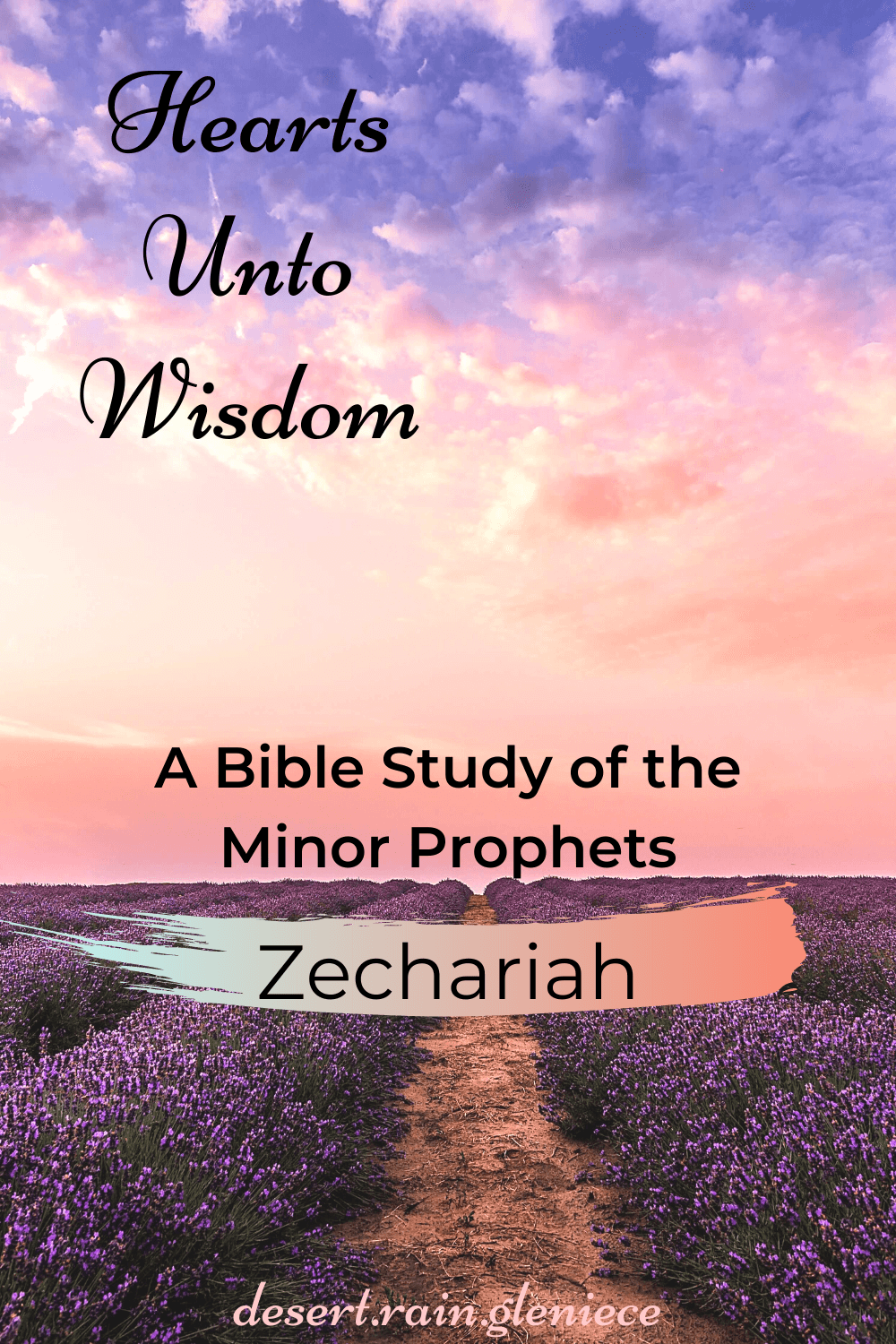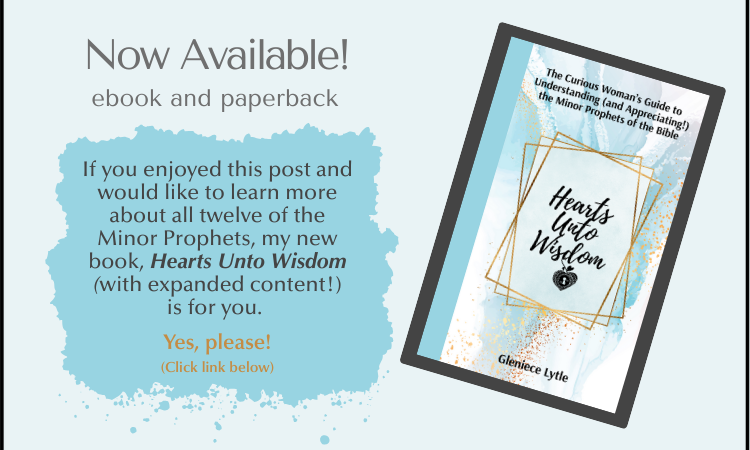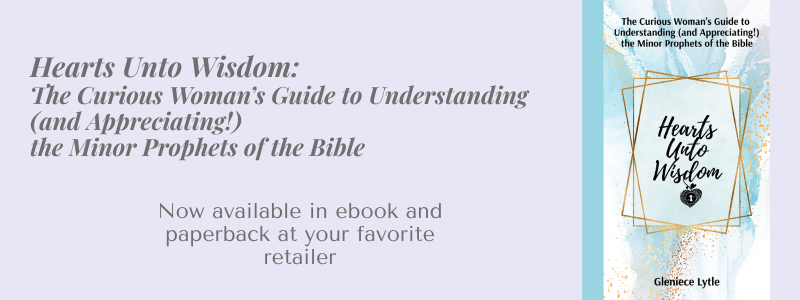Imagine a long, ornately carved table laden with delicacies; this is the book of Zechariah. You feast on each chapter and just when you think you’re full, you find more tasty tidbits to sample. This book is the longest of the twelve minor prophets and full of intriguing imagery, straightforward admonition, and sweet promises of peace and prosperity for those who hold tightly to the BRANCH.
Christ is the BRANCH (Zechariah. 3:8; 6:12). He is the strong stock that bears our sins, buds forth truth and righteousness, and sprouts hope in the core of our being.
Behold, the days come, saith the Lord, that I will raise unto David a righteous Branch, and a King shall reign and prosper, and shall execute judgment and justice in the earth. (Jeremiah 23:5)
And there shall come forth a rod out of the stem of Jesse, and a Branch shall grow out of his roots: And the spirit of the Lord shall rest upon him, the spirit of wisdom and understanding, the spirit of counsel and might, the spirit of knowledge and of the fear of the Lord. (Isaiah 11:1–2)
Welcome to Hearts Unto Wisdom
A Bible Study of the Minor Prophets
I thank you for joining me as I share biblical insight into the twelve books commonly referred to as the “Minor Prophets.” These Old Testament books, starting with Hosea and ending with Malachi, are minor only in regard to their length, and not because they lack significance.
So teach us to number our days, that we may apply our hearts unto wisdom. (Psalm 90:12)
[Words in bold or italics added for emphasis to Bible verses throughout this study.]
Zechariah
Zechariah, along with his partner prophet Haggai, prophesied during the Israelite’s return from their captivity in Babylon to Jerusalem. In the book of Haggai, the temple lay unfinished for years and God asks His idol-distracted, complacent children why their houses were complete and His was not.
But in this book, God shows Zechariah fantastic visions of the end times (some of which are head-scratchers, I admit, but were put there for a reason and deserve thoughtful meditation), and proclaims faithful promises to overturn our afflictions and lift us up like a regal banner and polished stones in His royal crown for all the world to see.
Thou shalt also be a crown of glory in the hand of the Lord, and a royal diadem in the hand of thy God. (Isaiah 62:3)
And the Lord their God shall save them in that day as the flock of his people: for they shall be as the stones of a crown, lifted up as an ensign upon his land. For how great is his goodness, and how great is his beauty! corn shall make the young men cheerful, and new wine the maids. (Zechariah 9:16–17)
We are afflicted people now, outcasts from an unworthy world (Hebrews 11:38), prisoners of hope (Zechariah 9:12), but that will all soon change at Christ’s return. God has not forgotten our pain and our struggles. He will avenge and make it right.
Zechariah was the righteous man that Christ mentions in Matthew 23:35 and Luke 11:51 murdered by the scribes and Pharisees, the “generation of vipers” of his day.
Wherefore, behold, I send unto you prophets, and wise men, and scribes: and some of them ye shall kill and crucify; and some of them shall ye scourge in your synagogues, and persecute them from city to city: That upon you may come all the righteous blood shed upon the earth, from the blood of righteous Abel unto the blood of Zacharias son of Barachias, whom ye slew between the temple and the altar. (Matthew 23:34–35)
God remembers all injustices, dear Christian. He will repay. Zechariah’s death was not forgotten by God those five hundred years between the book of Zechariah and when Christ spoke in Matthew. Zechariah’s name means “God remembers”!
There has been some confusion over the cross-reference recorded about the death of Zechariah. In Matthew 23:35, the margin notes take you to 2 Chronicles 24:21, where a Zechariah, the son of Jehoiada, was murdered in the court of the temple. This seems like it might be the same person, but the timeline is wrong.
In Zechariah 1:1, Zechariah says he is the son of Berechiah (spelled Barachias in the New Testament), who was the son of Iddo (his grandfather). Although the name Zechariah and the manner of deaths are similar, this is clearly not the same person. The 2 Chronicles incident is roughly three centuries before the book of Zechariah was written. It’s good to remember that footnotes and cross-references, although helpful, are not inspired but were added by men who sometimes make mistakes, as they did here. Christ, who is never mistaken, was referring to the author of this book when He lambastes the scribes and Pharisees in Matthew 23:35.
Zechariah’s visions
Thankfully, (for Zechariah and for us) an angel explains what he sees.
- A man on a red horse, other horses red, speckled, and white. Answer: These are angels that God sends to walk to and fro on the earth.
- Four horns. Answer: these are the powerful nations that brought down Judah, Israel, and Jerusalem.
- Four carpenters. Answer: these are those who will take down the horns.
- A man with a measuring line. Answer: This is an angel who measures Jerusalem and declares that Jerusalem will be a town without walls for the multitude of inhabitants.
- Seven candlesticks with seven bowls. Answer: seven represents perfection. The oil and the light represent God’s Spirit, power, holiness, knowledge, and truth flowing into us, His church.
- A flying roll (scroll). Answer: this was the volume of God’s accounts against wickedness that would sweep through the land and convict the thief and the liar.
- An ephah (a measure), a talent of lead (a weight, circle, coin), and one woman sitting on the ephah. Answer: the woman represents wickedness covered by a lead lid.
- Two women with wings carrying the ephah to Shinar. Answer: wickedness is taken and settled in the valley of Babylon.
- Four chariots flying between two brass mountains. Answer: these are four spirits or winds sent by God over the earth. The two brass mountains are not specifically explained but could represent God’s power and authority over the whole earth.
- Two olive trees. Answer: These are the two witnesses (angels sent by God) mentioned in Revelation 11:4 who will prophesy throughout the whole earth for three and a half years at the beginning of the tribulation.
While these visions seem random, like a weird dream that makes no sense, they all have meaning and purpose.
Zechariah’s visions point to God’s hand in everything.
God’s angels roam the whole earth. God keeps track of the wicked deeds and will soon punish the evildoers. Jerusalem shall be a city of peace full to brimming and God shall be the glory within her. The seat of paganism began with the tower of Babel (men trying to be their own god), and Babylon’s worldly influence will ultimately be destroyed by Christ’s second coming. God’s two witnesses are coming to speak truth to an obstinate world, and God’s perfection (seven lamps, seven bowls, seven eyes, seven Spirits) will reign triumphant on the earth.
In Zechariah 3:9 and 4:10, God speaks of seven eyes on a stone. Revelation 5:6 speaks of the Lamb which was slain having seven eyes. The Lamb is Christ and the eyes are the seven Spirits of God. But what are the seven Spirits of God exactly? There’s no definitive answer, but in Isaiah chapter eleven we learn this:
And there shall come forth a rod out of the stem of Jesse, and a Branch shall grow out of his roots: And the spirit of the Lord shall rest upon him, the spirit of wisdom and understanding, the spirit of counsel and might, the spirit of knowledge and of the fear of the Lord. (Isaiah 11:1–2)
Our Lord, Jesus Christ, is the cornerstone the builders rejected (Psalm 118:22; Matt. 21:42; Mark 12:10, Luke 29:17, Acts 4:11, 1 Peter 2:4–8). Christ is the stone with seven eyes.
He is the one who shall bear the glory and shall sit and rule upon his throne as a priest and counselor of peace (Zechariah 6:13). Christ was also Melchisedec (Psalm 110:4) recorded in Genesis chapter 14, whose name means King of Righteousness and King of Peace.
For this Melchisedec, king of Salem, priest of the most high God who met Abraham returning from the slaughter of the kings, and blessed him; To whom also Abraham gave a tenth part of all; first being by interpretation King of righteousness, and after that also King of Salem, which is, King of peace. (Hebrews 7:1–2)
Four prophecies fulfilled
The only Old Testament book to prophesize Christ would ride into Jerusalem on a donkey is Zechariah and this prophecy was fulfilled in Matthew 21:5!
Rejoice greatly, O daughter of Zion; shout, O daughter of Jerusalem: behold, thy King cometh unto thee: he is just, and having salvation; lowly, and riding upon an ass, and upon a colt the foal of an ass. (Zechariah 9:9)
Tell ye the daughter of Sion, Behold, thy King cometh unto thee, meek, and sitting upon an ass, and a colt the foal of an ass. (Matthew 21:5)
The prophecy of Matthew 26:31 and Mark 14:27 was first written in Zechariah.
Awake, O sword, against my shepherd, and against the man that is my fellow, saith the Lord of hosts: smite the shepherd, and the sheep shall be scattered: and I will turn mine hand upon the little ones. (Zechariah 13:7)
Then saith Jesus unto them, All ye shall be offended because of me this night: for it is written, I will smite the shepherd, and the sheep of the flock shall be scattered abroad. (Matthew 26:31)
Another prophecy written by Zechariah and fulfilled in Christ’s day is this:
And I will pour upon the house of David, and upon the inhabitants of Jerusalem, the spirit of grace and of supplications: and they shall look upon me whom they have pierced. (Zechariah 12:10)
For these things were done, that the scripture should be fulfilled, A bone of him shall not be broken. And again another scripture saith, They shall look on him whom they pierced . . . (John 19:36–37)
Revelation 1:7 also speaks of this: “Behold, he cometh with clouds; and every eye shall see him, and they also which pierced him: and all kindreds of the earth shall wail because of him. Even so, Amen.”
And the final fulfilled prophecy is in Zechariah chapter 11. God tells Zechariah to feed the flock of slaughter, so named because the shepherds spiritually kill their flock for profit and bless the Lord while doing it! (Zech. 11:5). Zechariah asks the leaders of the people to pay him what he’s worth to them and they give him thirty pieces of silver—the equivalent of the price of an injured slave (Exodus 21:32). This is the exact price given to Judas to betray Christ.
Then one of the twelve, called Judas Iscariot, went unto the chief priests, And said unto them, What will ye give me, and I will deliver him unto you? And they covenanted with him for thirty pieces of silver. (Matthew 26:14–15)
Interestingly enough, in Matthew 27:9-10, Christ says that it was Jeremiah the prophet that spoke of the thirty pieces of silver being His value in the eyes of the children of Israel. But no actual verse in Jeremiah exists where this is written. Christ said Jeremiah had spoken this, not written this. It could be that Zechariah remembered hearing this when he was young and wanted to preserve it.
Another explanation might be this: the order of Old Testament books was different than it is now. It was divided into three parts.
- They were the Law, which contained the five books of Moses;
- the Prophets, which contained the former and latter prophets (the former began at Joshua and the latter began at Jeremiah);
- and lastly, the Hagiographa, or the holy writings, which began with the book of Psalms.
Hence, the passage in Zechariah that was in that latter book of the Prophets might be cited under the umbrella name of Jeremiah.
Beauty and Bands
Taking on the role of a shepherd, God told Zechariah to take two staves (a staff for walking or guiding a flock) and name one Beauty and the other Bands. The staff Beauty was named for Israel, His chosen and beloved people. God told Zechariah to cut it in two. This represented the severing of the covenant God had with Israel. The old covenant was removed to usher in a new, more glorious one after the death and resurrection of Jesus Christ.
The staff named Bands was also cut in two and represented the breaking of the bonds of brotherhood between Israel and Judah. Although Judah and Israel had already been separated for centuries by this point, I believe the breaking of this staff vividly shows that the binders of exclusivity that the physical tribes of Israel and Judah had were broken so that God’s salvation would be open to any nation who chooses the one true Shepherd.
But he is a Jew, which is one inwardly; and circumcision is that of the heart, in the spirit, and not in the letter; whose praise is not of men, but of God. (Romans 2:29)

Joshua, Christ typified
In Zechariah’s day, Joshua, the son of Josedec, was the high priest of Jerusalem. Joshua happens to be the Hebrew name for Jesus!
God instructed Zechariah to direct the other priests to make crowns of gold and silver and place them upon the head of Joshua and say, “Behold, the man whose name is the BRANCH; and he shall grow up out of his place, and he shall build the temple of the Lord” (Zechariah 6:12). Ah, here we learn that Joshua, the high priest, represents the ultimate high priest of God, Christ Jesus. It is He who builds the temple and that is us, friends! We are the temple filled with the Spirit of God (1 Cor. 3:16).
In a vision, Zechariah sees Joshua standing by the angel of the Lord and Satan standing by to resist him—Christ dealt with Satan’s resistance His whole earthly life until His death—but the Lord rebukes Satan.
Satan is always trying to wreck our lives and provoke us to sin. It is a constant battle. But he has no power over us unless we act on our temptations. James 4:7 says, “Submit yourselves therefore to God. Resist the devil, and he will flee from you.”
Zechariah’s vision continues with an image of Joshua in filthy clothes. The filth is our sins, iniquities, and short-comings that Christ bore to the cross. He took on our sins so we could become clean. Christ removes our filthy garments and replaces them with His garments of splendor.
I will greatly rejoice in the Lord, my soul shall be joyful in my God; for he hath clothed me with the garments of salvation, he hath covered me with the robe of righteousness, as a bridegroom decketh himself with ornaments, and as a bride adorneth herself with her jewels. (Isaiah 61:10)
But God requires we wear His garments in truth and holiness. In the book of Zechariah, God lays out for us His simple dos and don’ts.
Do:
- Speak the truth to your neighbor (Zechariah 8:16).
- Defend the truth and stand for peace in your home and nation (Zechariah 8:16, 19).
- Judge righteously (Zechariah 7:9).
- Show mercy and compassion to all (Zechariah 7:9).
Don’t:
- Harbor ill will or hatred for your neighbor (Zechariah 7:10; 8:17).
- Take advantage of the widow, the fatherless, the stranger, or the poor (Zechariah 7:10).
- Love a lie, which God hates (Zechariah 8:17).
These come from the spirit of Babylon and God mandates we separate ourselves from her.
Wherefore come out from among them, and be ye separate, saith the Lord, and touch not the unclean thing; and I will receive you. (2 Corinthians 6:17)
I’m sure you’ve noticed, dear Christian, these simple dos and don’ts are not so simple to live out. Our transformation into the likeness of Christ is a lifelong endeavor and impossible on our own strength. God wants our willing and pliable hearts and He gives us His Spirit, His power, to accomplish these things.
Then he answered and spake unto me, saying, This is the word of the Lord unto Zerubbabel, saying, Not by might, nor by power, but by my spirit, saith the Lord of hosts. (Zechariah 4:6)
God declared that Zerubbabel, the appointed governor of Jerusalem, would finish the temple (Zechariah 4:9), and His word is true. But He wanted those involved in the construction to know their strength wouldn’t accomplish this deed, but God’s. This goes for us, too. God does the heavy lifting. He provides His Spirit and gives us the gift of faith. Without God, we can do nothing (John 15:5).
For by grace are ye saved through faith; and that not of yourselves: it is the gift of God: Not of works, lest any man should boast. For we are his workmanship, created in Christ Jesus unto good works, which God hath before ordained that we should walk in them. (Ephesians 2:8–10)
We all have to start at the beginning somewhere. In our faith walk, our careers, our projects, and our families. It can be discouraging to see someone else excel in the areas we want to excel and haven’t yet. But God speaks of this frustration in Zechariah 4:10, “For who hath despised the day of small things? for they shall rejoice.” There is no reason to despise our hard beginning or our seemingly small gains. God tells us we shall rejoice. Why? Because it is God who accomplishes that which He wants in us and for us.
Being confident of this very thing, that he which hath begun a good work in you will perform it until the day of Jesus Christ. (Philippians 1:6)
In that day
The Bible uses the phrases “in that day”, “at that day”, “the day of the Lord”, and “in the last days” when referring to His second coming.
In that day, we will have great cause to sing! because Christ says, “I will dwell in the midst of thee” (Zechariah 2:10). God will defend Jerusalem and it shall be called a city of truth (Zechariah 8:3).
In that day, God will destroy all nations that come up against Jerusalem with a consuming plague (Zechariah 12:9; 14:12). And many nations shall be joined to the Lord and He shall call them His people (Zechariah 2:11, 8:11).
In that day, God will cut off the names of the idols. Anything that brought us spiritual confusion, any object or ideology that defiled us, that caused us to sin, won’t be remembered anymore. He will cause the prophets and unclean spirits to pass out of the land. With evil gone once Christ returns, there will be no more need for prophecy (Zechariah 13:2) because everything that we speak of concerning Christ will be fulfilled by His very presence.
In that day, there will be no more night (Zechariah 14:7; Isaiah 60:19–20), and Living water of life shall flow out from the temple, the throne of God (Zechariah 14:8; Revelation 22:1).
The sun shall be no more thy light by day; neither for brightness shall the moon give light unto thee: but the Lord shall be unto thee an everlasting light, and thy God thy glory. (Isaiah 60:19)
But whosoever drinketh of the water that I shall give him shall never thirst; but the water that I shall give him shall be in him a well of water springing up into everlasting life. (John 4:14)
In that day, everything that exists from the mundane items to the highly regarded will be HOLINESS UNTO THE LORD (Zechariah 14:20; Exodus 28:36).
The very last sentence in this monumental “minor” book of prophecy is very interesting.
In that day, there shall be no Canaanite in the house of the Lord. I don’t believe this is referring to a physical nationality, but a moral type, the very antithesis of what God wants Israel to be. A Canaanite, in this example, is a people set on rebellion against God’s rule and authority.
God wants us to purge our Canaanite hearts and be welcomed into His glorious kingdom where nothing hurts or causes fear, nothing makes us sick or causes tears, where evil is nowhere to be found, and true peace and prosperity abounds.
The Lord shall be king over all the earth in that day and dwell in the midst of Jerusalem. He is our God of truth and righteousness (Zechariah 8:8; 14:9).
It won’t be long before we, who are weak (according to the world), shall be like King David and the house of David (we, again) shall be as God (Zechariah 12:8).
What wonderful words to ponder.
Abiding in the Vine,
~ Gleniece

Hearts Unto Wisdom
If you like this content and would like to stay up to date, please sign up below for my monthly newsletter, Abide & Blossom. I look forward to seeing you on my list. Thank you!
Would you like to share this post?



